In cape comics, it’s not uncommon for superpowered beings to find themselves operating on opposite sides of an ethical divide. Most times, when one character feels like the other has gone too far, disagreements get settled with punches and explosions. Superfights will probably still happen in The American Way: Those Above and Those Below, but its characters’ conversations about their personal politics is just as exciting.
Note: For each issue of The American Way: Those Above and Those Below, I’ll be talking to author/screenwriter John Ridley about the events of the latest instalment. The series is set during the 1970s, as members of a defunct federal superhero program try to figure out how to change the world for the better. The American Way: Those Above and Those Below features art by Georges Jeanty, Danny Miki, and Nick Filardi. The interview that follows discusses events in issue #4.

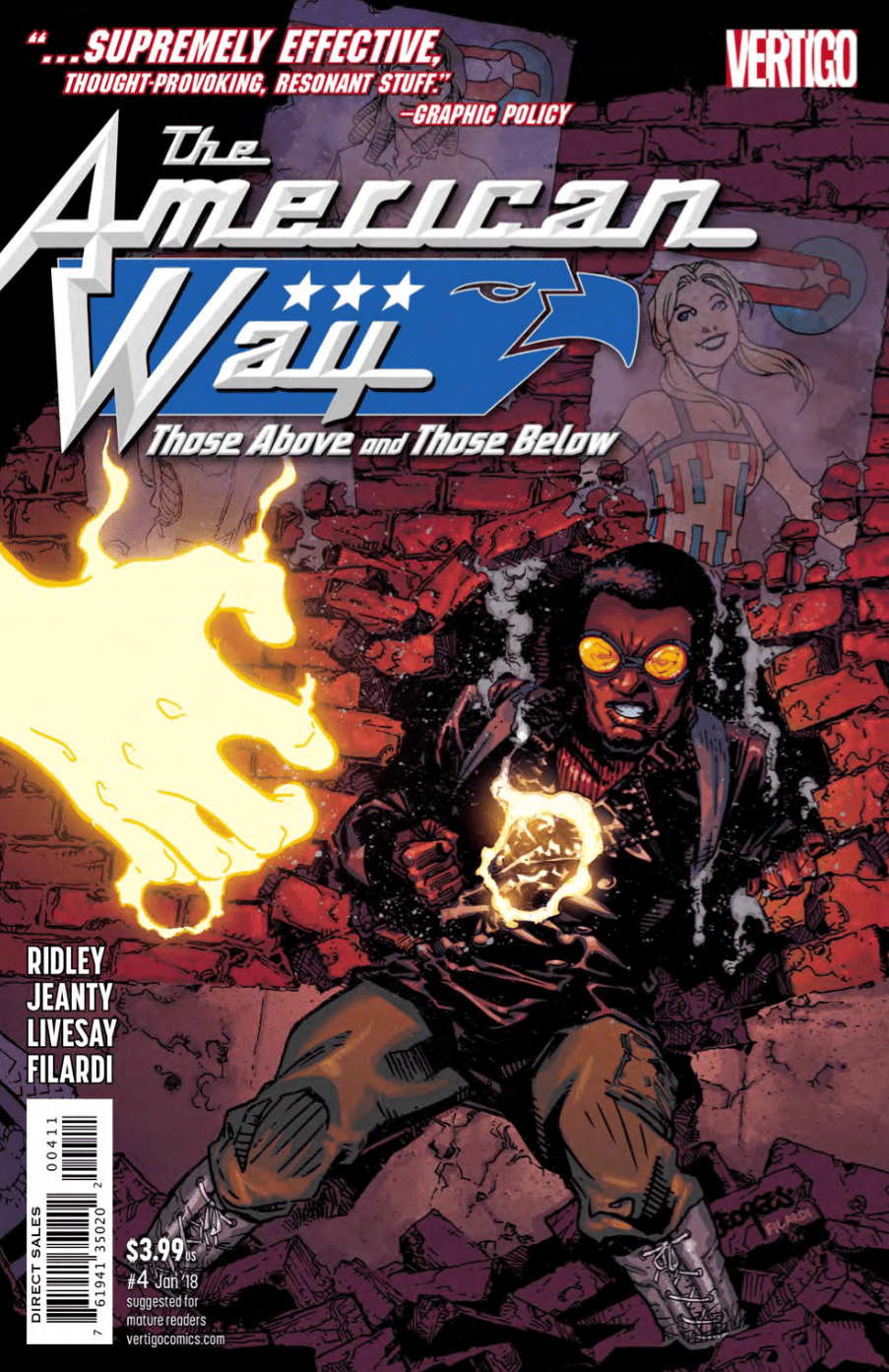
The Story So Far
In , another former superhero named Amber Eaton had to deal with dissension in the ranks of her underground radical activist group. Her one-time teammate Missy Deveraux continued her run for political office, built on a platform of unashamed Southern pride and reverence for the Confederate past.
An attempt on Missy’s life happened during a campaign stop, from an assailant who appeared to be a black man with pyrokinetic powers. Jason Fisher — once known as astronaut-themed metahuman New American – gets paid a visit by old colleague Erskine Wells, who wants him to track down the fiery new metahuman.
io9: Issue #4 came across as a bit slower-paced than previous ones; the first three had a lot more dramatic happenings. This one felt like a bit of table setting for the finale. Talk to me about pacing and how you thought about this particular chapter in the story.
John Ridley: When Erskine tells Jason, “Look, you gotta be part of this, you gotta go deal with Amber,” the expectation is that they’re going to really get into it and they don’t. I don’t say this disparagingly about other series but, typically, it’s the space where you’re going to duke it out and have this big fight, and that’s sort of what people with powers are meant to do.
Here, the conflict escalation is, “I know you. Like, really know you. And I need to deal with you.” Jason and Amber’s conversation is based on their history. Amber in particular is hellbent on living by her ideals and Jason is trying to do what he thinks is the right thing. They haven’t seen each other in years and are on opposite sides trying to work towards justice.
The scenes with Missy, her husband, and Jason are where I wanted to have a moment where two lead characters are supposed to have a conversation, but they can’t look each other in the eye. Missy knows she can’t speak to Jason the way that she could speak to her entire constituency. So, she needs her husband to engage in a little bit of a misdirection, and it winds up that she doesn’t talk to Jason face-to-face. For me, it was important to not to have it be, like, “Comic books! All they do is fight.” For me, it’s all about the idea that powers and abilities do not equal resolution. It’s important to get to a point in this story where Missy, Jason, and Amber have to have real conversations on who they are, where they are, and what their expectations are.
And those conversations are loaded. “Did you come here to kill me?” “Are you being set up?” Because you can talk about being higher-minded, but the reality is that we all give into our emotions. Missy – who’s so sure about the things that she says and what she’s standing for – still can’t look Jason in the eye, because she knows she’s a fraud in that regard. So, for me, that was the most important element about the storytelling, building things up like that, issue by issue. It’s never been a series about how the powers dictate the storytelling. It’s about how these individuals try to reconcile their history, their individuality, their perceptions with the fact that “If it comes to it, I may kill this person.” Or asking, you know, what happens when ideals and actions don’t match up anymore.
When Missy’s husband asked what happens in the last issue – specifically, the assassination attempt – he says, you could have changed things in the moment, why did you choose not to? She has time manipulation powers, right? Her answer is, essentially, “I don’t have the strength of clarity anymore to do those kinds of things.” And that’s a big thing for a superhero-type character to say! It’s what we’re working towards.
io9: Once again, we see Jason caught in the middle of a Catch-22. When he goes to the apartment where the suspected metahuman was living, he’s working with these white members of the establishment authority, and they’re talking disparagingly about “coloreds with superpowers.”
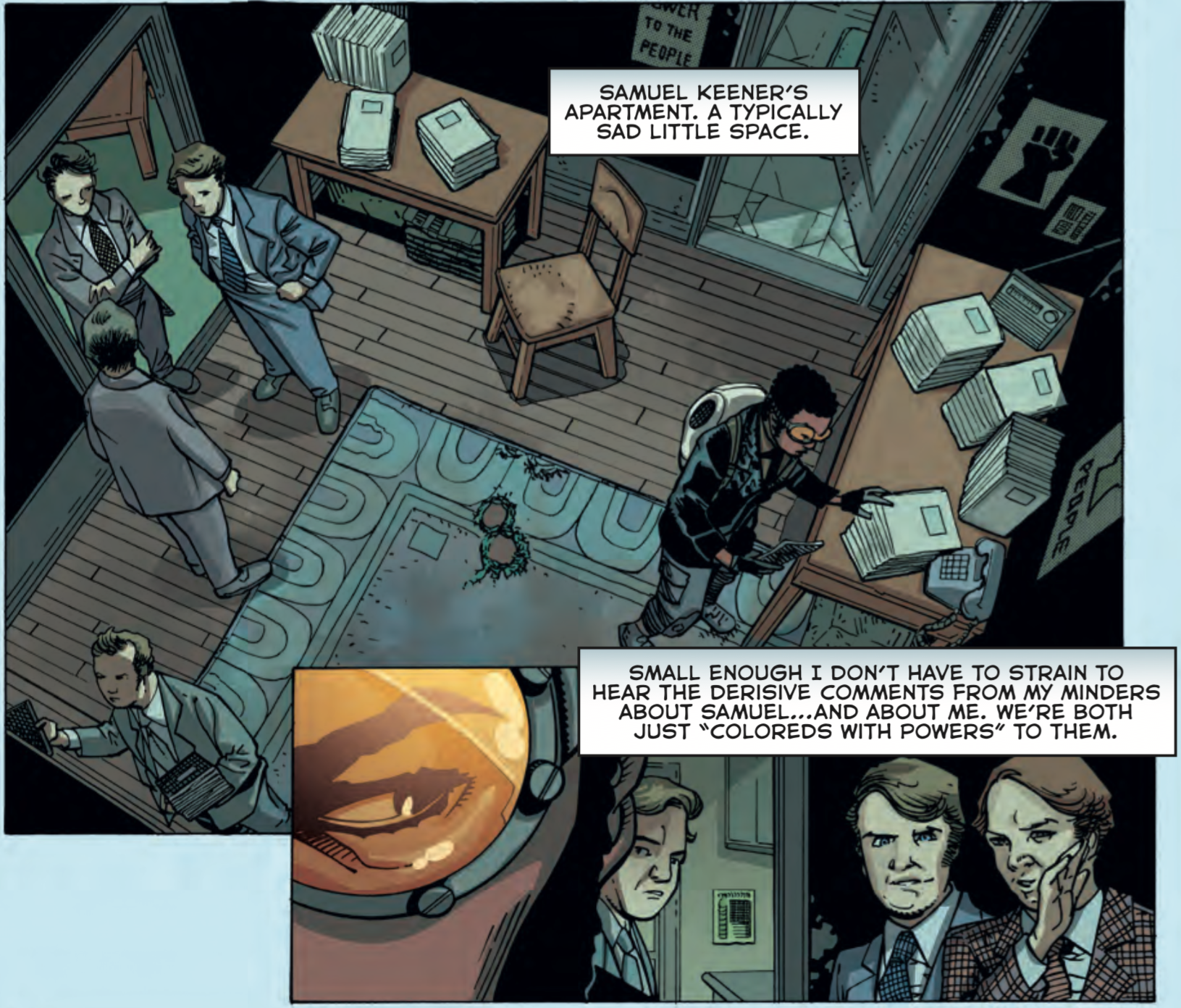
io9: On the other hand, the black neighbour doesn’t initially trust him, either, because he’s working with them. I’m not asking you to spoil it, but is Jason ever going to find a place where he gets to enjoy a measure of trust? Because it feels like, in this whole series so far, he’s screwed anywhere he goes, and whenever he tries to do the right thing.
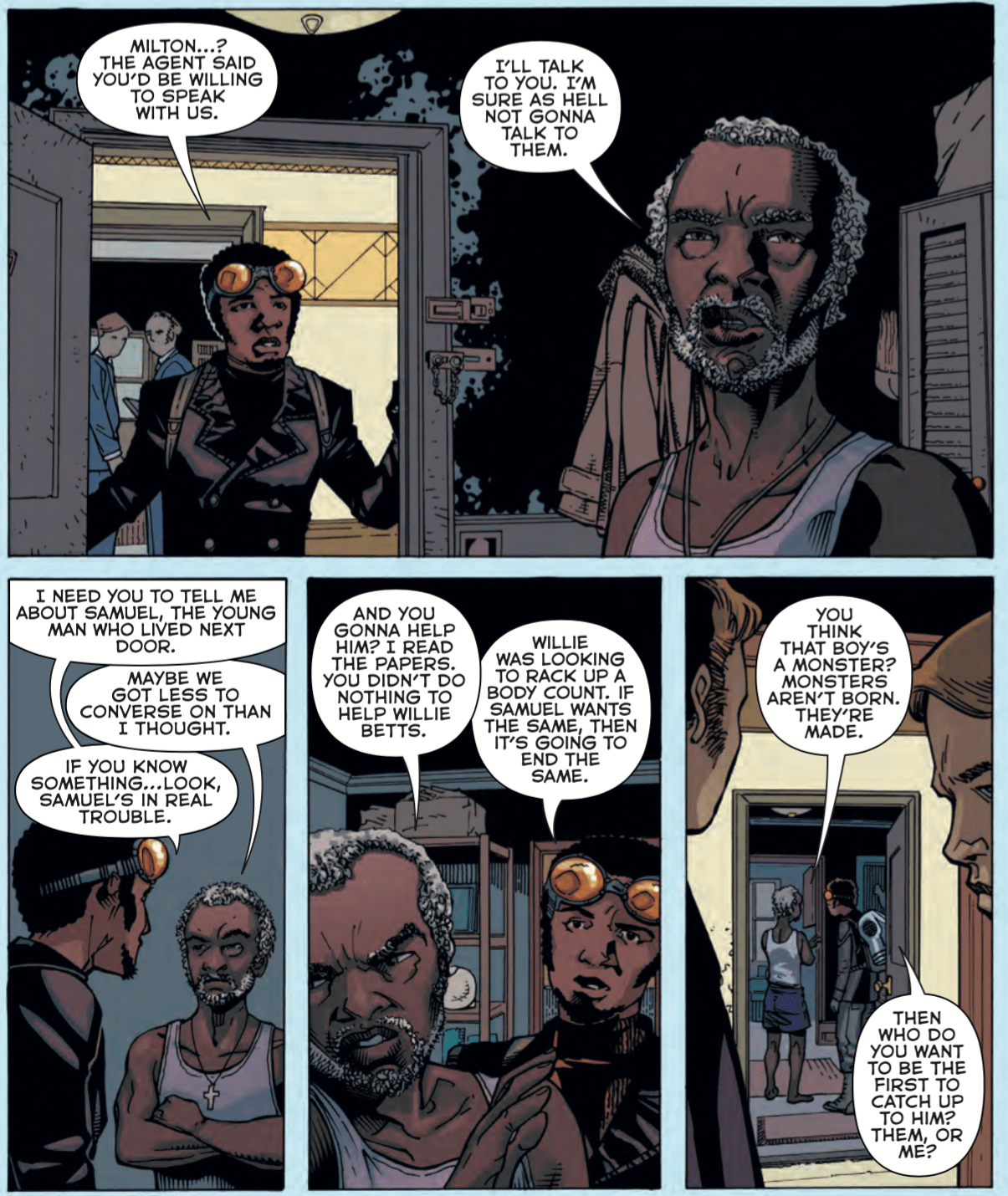
Ridley: You ask a very good question! And to not spoil it, I would say, for all of these characters, and particularly Jason — because he’s so central to the story — the feelings of unease are very central in what I’m trying to express. Not just in a political sense but, “Hey, I’m a guy with superpowers, where do I fit in? As a person? As an American? As a black man? As a black man with my own set of particulars?”
Of these three who are left, Jason is a creation of the system, a person of colour who was created to be a superhero. He has to ask himself, “So, now that I have these abilities, where do I really fit it?” He didn’t wake up one day with powers – he agreed and volunteered for this. He had certain expectations and then had those expectations dashed. Now, it’s not so much about him finding a space where he’s approved, but creating the space where those approvals are no longer necessary. Understanding I have a thing to do, and I have to go do this thing.
There are always going to be individuals who do not approve of what Jason is or what he does. But it’s no longer about trying to figure one’s self out, but trying to figure that space where there’s empathy for others. And to simply worry about how one is measured on a day to day basic level. And that’s what I’m trying to work on with Jason. We’ll see!
io9: The thing with Missy that’s really interesting here, is, she feels kind of despicable. She talks about political gamesmanship and the optics of having, you know, a black guy shut down the other black guy. But at the same time, her self-doubt is very resonant. She’s still not telling her husband about the cancer. Talk to me how you decided to shape her at this point.
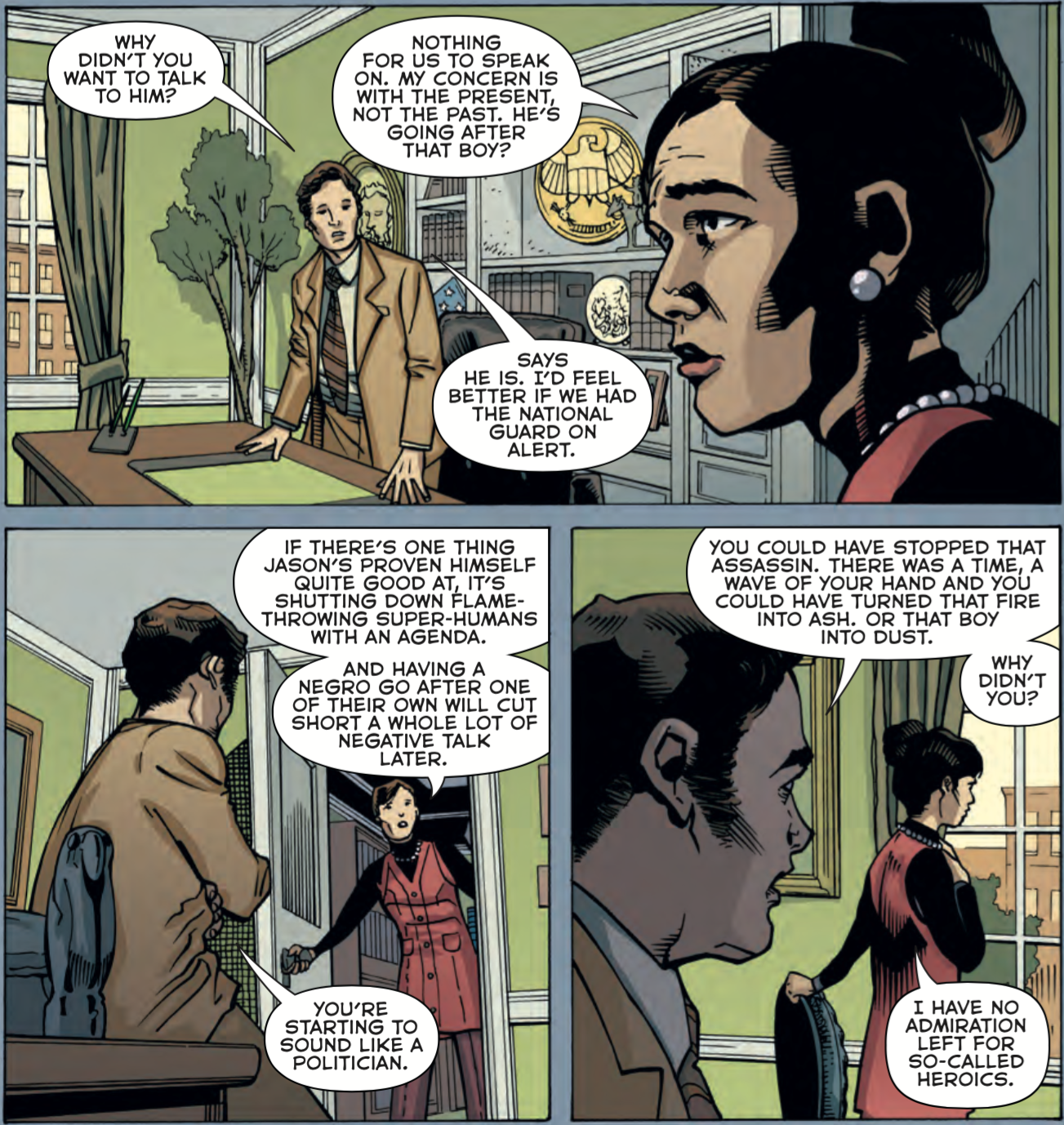
Ridley: It’s really about deceptions. Those personal deceptions. How do we lie to ourselves? I talked to somebody else about writing the other day, and about writing for one’s self. And when you write for the public, it’s one thing to shape stories a certain way. When you write for yourself, and you’re creating your own narrative, and you know other people may not ever see it, but you still lie on the page? That’s very, very powerful.
And so, here’s Missy – there are things that she is doing in a very personal space that’s so built on denial. Compartmentalising. Not owning up to certain things. She knows she couldn’t really look Jason in the eye. She know she couldn’t really talk to him about certain things. She knows she’s lying to her husband. There’s a real tragic sense, I hope, in how she struggles to find a reason to live and fight. But she is so embedded in her own demise that she cannot see a better way.
io9: And it feels like there may be some self-loathing there, too. She’s part of this whole charade, and it’s kind of her charade. Where, maybe she doesn’t feel like she can trust herself.
Ridley: It’s a question of, “Does she know that she is part of a reprehensible system?” Absolutely, she does. Her thinking is, “Look, I know I’m going to go, and I was part of something ugly. The least I can do, or the only thing I can do, is make people believe the thing I was a part of was not such a bad thing.” That is, as opposed to owning up and saying, “You know, it was really horrible. It was really, really ugly and I don’t have a lot of time to change it. But I’m going to own up to it and everyone’s going to hate me.”
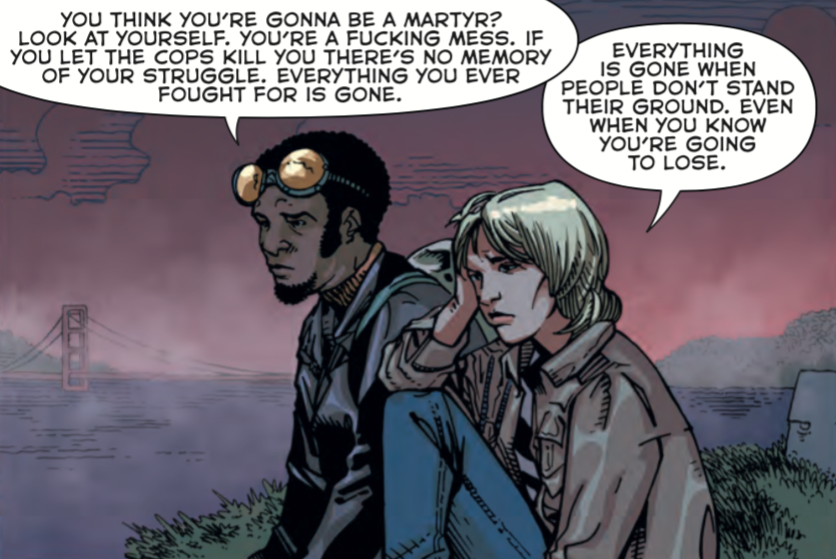
All these characters are trying to figure out, when it’s all gone, how are people going to remember them? What are they going to say about them? For Amber, when she talks about her legacy, and Jason’s saying, “What, do you think you’re going to be remember as a martyr? You’re just a messed-up little girl.” We see it almost every day now, where people are having to apologise for the way they live. The way they have to reconcile what we know about them, publicly, and how they’re represented, or what they’re going to do with the art that they have created. That is an ongoing discussion.
As for Missy, I think she’s hyper-aware of the things that she’s involved in in the past, and in the present, they’re not laudable, but at the same time she doesn’t know a way to reconcile with who she is and what she’s been doing. So it is tragic, but I’m glad it feels that way. Because the opposite would be that you don’t feel anything. and certainly don’t remember that character very strongly.
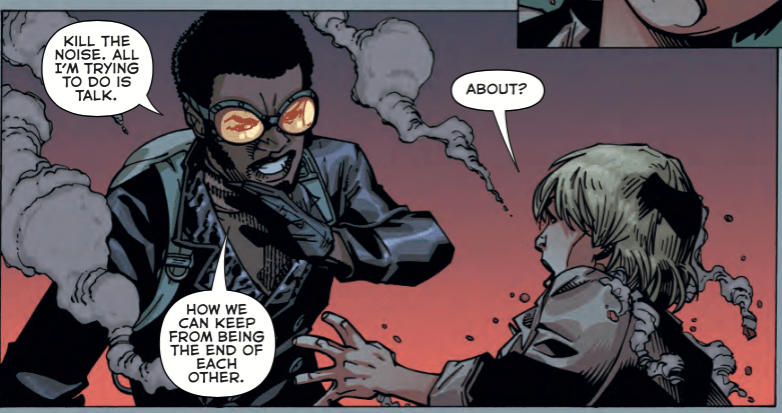
io9: There’s this whole sense of finality around the whole thing. Are you going to burn down this universe? Are you going to leave enough around for you to play with if you get another go around?
Ridley: That’s a great question…
io9: I know there are larger, market forces that dictate these things.
Ridley: That’s the most important thing. That anybody — at all in any way, shape or form gives a shit — will probably dictate it. But, 10 years ago, I never much thought that there would be a possibility to even do another series. Things are very terminal and finite within this. One of the larger points, going forward, is that we are closing out the ’60s and the ’70s in that part of the universe. Part of what I’m putting in place now, is the groundwork for — if anybody ever sees any more American Way or not — a new beginning.
The first go-round, most everybody was wiped out one way or another. In life, seasons turn, pages turn, the story is turning. And I do want to set up — just emotionally, if nothing else — that there is a future. There is a potential for a better future. But Jason in particular has got to invest in it. Stop talking about what other people think, what is your involvement in the future? And I think you will see that going forward in the closing issues.
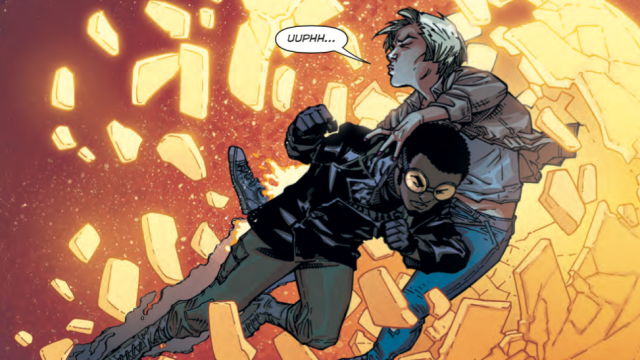
Comments
One response to “When The Good Guys Don’t Know If They’re Good Anymore”
So retreading 80s DC, there will be some anxiety driven teenager from an alternate world where all the heroes are just in comics. Digging deep here.